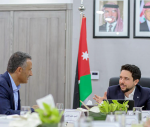You are here
IMF programme — choice or necessity?
Nov 16,2015 - Last updated at Nov 16,2015
The International Monetary Fund conducted last week exploratory meetings with the Ministry of Finance and the Central Bank.
Negotiations were reportedly conducted in a friendly atmosphere to reach a new economic reform programme to be implemented in the coming three years, 2016-2018.
Most likely, the final text of the programme will be finalised and agreed upon during the next visit of the IMF mission to the Kingdom, scheduled for January 2016.
The prime minister described the adoption of a new programme of economic reform sponsored by the IMF as a matter of choice.
In a way, this is right, but some may believe it is rather a necessity.
A new IMF economic reform programme is optional, in that Jordan is not obliged to ask the IMF for help, as was the case in the past.
At this point in time, the country is not facing a foreign currency crisis. Nor it is late in repaying all installments and interest on foreign loans.
Furthermore, Jordan does not need, and did not ask for, any sort of debt relief, including rescheduling, which would have needed the support of the IMF.
However, entering into yet another programme sponsored by the IMF may be a necessity because the Jordanian economy is still facing a set of serious challenges, prominent among which are: a sizeable budget deficit, rising public debt, a very high unemployment rate, a decline in economic growth, the need for structural reforms to raise the efficiency of the economy, improve the business and investment climate, and boost competitiveness.
One should take into consideration the fact that Jordan is wide open to the outside world. It needs the cooperation and confidence of donor countries and lending banks.
In this respect, everyone is aware of the importance of having a credible institution like the IMF closely follow up Jordan’s economic developments and providing a certificate of good performance, which testifies that things are going in the right direction and that the government is serious about economic reform and deserves support.
The new IMF-sponsored programme will use 2015 as a base year.
Implementation of the programme will start in 2016, even though the budget for 2016 is already prepared, making one wonder whether this budget represents the spirit and direction of the programme in its first year as envisaged by the IMF.
If that is the case, one can assume that the programme will not come up with surprises or extremely difficult measures.
The draft budget for 2016, as presented by the government last week, confirms that there will be continuity.
It does not seem that the IMF took a direct role in formulating the budget, since the planners of the budget are aware of what is acceptable to the IMF and what is not.
The coming programme will aim at stimulating economic growth, creating jobs, attracting investments, and controlling budget deficit and public debt.
Even if all the estimates in the budgets of the central government and the independent governmental units will be achieved, we will still be left with a deficit before grants in the order of JD1.2 billion ($1.7 billion) or 4.5 per cent of GDP.
This means that the public sector as a whole continues to be dependent on foreign grants and loans. These, of course, cannot be taken for granted under any circumstances.
This state of affairs renders the IMF programme an option, but a necessary one.












